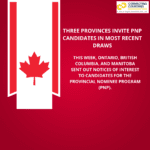How can a change in my NOC impact my PR application?
Occasionally, Canadian immigration applicants may apply for permanent residency (PR) with one National Occupation Classification (NOC) code then change it later in their immigration process.
For example, an applicant may apply for PR to Canada through one of Canada’s Express Entry-managed programs and then be called to pursue PR through one of the country’s 11 Provincial Nominee Programs (PNPs).
Let’s use the Ontario Immigrant Nominee Program (OINP) as an example. We will investigate this problem using a hypothetical applicant who has been accepted via a tech draw.
Lincoln, a software developer, got a Notification of Interest* (NOI) from the OINP as part of a technical draw.
*It is worth mentioning that in Ontario, the term “NOI” refers to the invitation sent by the OINP to the selected candidate to file an application for a provincial nomination.
Lincoln acquired his NOI after submitting an expression of interest to the federal Express Entry pool. After assessing the candidate’s profile in the Express Entry federal pool, the province administration granted him an Enhanced PNP with a NOI attached. Lincoln received the NOI because he satisfied the precise qualifications for the OINP tech draw, which included having a primary NOC code from the list of OINP-targeted occupations.
At this point, Lincoln can submit his provincial candidacy to the Ontario government. To do so, he must submit the Ontario government with supporting papers, such as reference letters, to back up his claim for the NOC code.
Reference letters should be acquired from each employer to allow the province to confirm that his employment activities and responsibilities correspond to the NOC shown in his federal Express Entry profile – Software Developers and Programmers (NOC 21232).
What happens if my NOC changes during the immigration process at the provincial level?
The candidate’s supporting papers are reviewed to ensure that their employment function and duties are appropriately aligned with a NOC on the province/territory’s targeted occupation list.
What happens next will be determined by the results of this evaluation, particularly if the provincial/territorial government concludes that a candidate’s declared NOC does not correspond to their employment role/responsibilities.
Note: The following will use Lincoln, our hypothetical candidate, as an example.
Hypothetical situation 1: Lincoln claimed NOC 21232 (Software Developers and Programmers) for his application. However, the Ontario government evaluated his profession as more closely aligned with NOC 21234 – Web Developers and Programmers.
Hypothetical situation 2: Despite claiming NOC 21232 (Software Developers and Programmers) on his application, the Ontario government rated his position as better fitting with NOC 22220 – Computer Network and Web Technicians.
In the first situation, Lincoln’s work does not match his reported NOC, but his application may be processed because his evaluated NOC is still on the Ontario government’s list of targeted occupations for tech draws. The OINP will contact the client in this matter to obtain further information.
In the second situation, Lincoln’s evaluated NOC does not appear on Ontario’s targeted occupational list, making him ineligible for a provincial candidacy through the OINP. His application will be rejected.
What should I do if I discover that my primary NOC differs from the one I first submitted with at the provincial level?
Candidates who discover that their primary NOC has changed and is no longer listed as a targeted NOC before submitting their application for a provincial nomination may opt not to proceed with their provincial application, which will be rejected as ineligible.
Those who submit their application despite this awareness, or who discover the NOC change after submission, may seek to withdraw their application, but they will most certainly forfeit the processing costs paid for their provincial nomination application.
Issues with revised NOCs at the federal level
After successfully receiving a provincial nomination from Ontario, a change in NOC may have an influence on a candidate’s federal PR application.
Candidates with a NOC-specific provincial nomination must keep the same NOC as their principal occupation when they originally applied to the province.
NOC-specific provincial nomination candidates who change their primary NOC code at the federal level may have their application denied owing to noncompliance with the qualifying rules for their provincial nomination.
Why does my NOC code matter?
Understanding why NOC codes exist is essential for understanding how a modified NOC might affect your application.
In short, NOC codes play an important role in a candidate’s eligibility for Express Entry, Canada’s application management system for three major economic immigration programs: the Federal Skilled Worker Program (FSWP), the Canadian Experience Class (CEC), and the Federal Skilled Trades Program.
FSWP
In addition to other qualifications, applicants must have at least one year of paid, full-time or comparable part-time, continuous, skilled* work in the same NOC (main NOC) to be eligible for the FSWP.
*To be eligible, this job experience must fit under one of the following NOC Training, Education, Experience and Responsibilities (TEER) categories: TEER 0, TEER 1, TEER 2, OR TEER 3
CEC
In addition to other program criteria, applicants must have at least one year of paid, full-time or comparable part-time, skilled work experience* in Canada within the past three years to fulfill the minimum requirements for CEC eligibility. Note that job experience earned while studying does not count toward satisfying this criterion.
*To be eligible, this work experience must belong to one of the following NOC TEER categories: TEER 0, TEER 1, TEER 2, OR TEER 3
FSTP
To be eligible for the FSTP, applicants must have at least two years of skilled work experience in specific qualified NOC categories during the previous five years, in addition to meeting other program criteria.



